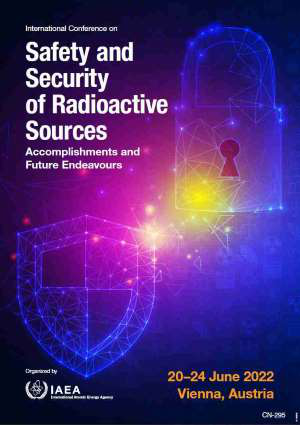Speaker
Description
Nuclear and Radiation Safety Agency of the National Academy of Sciences of Tajikistan (NRSA NAST) is the state regulatory body, drives state unified policy in the field of radiation safety.
The primary task of the safety and security of radioactive sources is their state accounting and control in the Republic of Tajikistan, which is subject to:
- ionizing radiation sources (IRS) (open and closed radiation sources, the number and activity of which exceed the level of removal and devices for generating radiation, the energy of which is more than 5 keV);
- new manufactured IRS upon arrival at the finished products storage;
- radiopharmaceuticals, kits for immunological analysis, radioisotope generators for medical purposes, compounds labeled with radionuclides, as well as radioisotope drugs and solutions based on short-lived radionuclides with a half-life of up to sixty (60) days.
The State System of Accounting and Control of Nuclear Material at State is performing by NRSA NAST, the State nuclear regulatory authority of Tajikistan which is an independent Governmental authority and has the right to elaborate and approve regulations and guidance documents, issue licenses for relevant activities, carry out inspections and independently perform its regulatory decisions.
Decree of the Government of the Republic of Tajikistan “on Organization of the State systems of accounting and control of nuclear materials and ionizing radiation sources” approved by the Government Decree No. 499, 4th of October 2013 foresees that an operating organization performs annual physical inventory taking.
Tajikistan was one of the first among the post-Soviet Central Asian Republics, adopted a law on the State control of export of arms, military equipment and dual-use goods (in 1997).
There are about 340 organizations using IRS in Tajikistan, of which:
- about 40 users of IRS;
- about 300 users of generating IRS.
NRSA NANT, within its competence, provides:
a) creation and operation of systems for accounting and control of IRS;
b) physical protection of IRS;
c) management of collection and storage of information on accounting and control of IRS;
d) conducting inspections to check the state of security systems, accounting and control of IRS in the operating organization;
e) submission to state bodies of information on the presence and movement of IRS, as well as export and import in accordance with their requests;
f) cooperation within the framework of international agreements and programs (projects) on the security, accounting and control of IRS, in accordance with the current legislation;
g) compliance with the confidentiality regime of information about IRS to prevent unauthorized access to them.
Within the framework of the state system of accounting and control of IRS, the State Database of Nuclear Materials and the State Register of IRS are being created.
A joint project of NRSA NAST and the US Nuclear Regulatory Commission was completed with an inventory and creation of a database of radioactive sources. The aim of this project was to conduct an inventory of all available IRS (closed, open, generators and related equipment) and stored them to the database. Under this project, an inventory of all sources was completed in all regions of Tajikistan.
All collected data by source were entered into the database. This database is called ARIS and it an information system that allows user to introduce, store and process data about the IRS, designed for radiation safety regulators. The uniqueness of the ARIS program is the automatic determination of current activities and categorization of sources (the classification is carried out in accordance with the IAEA and the Safety Guide - No. RS-G-1.9, - Recommended source categories used in general practice) and easy user interface on data processing.
| Country OR Intl. Organization | Таджикистан- Tajikistan |
|---|

